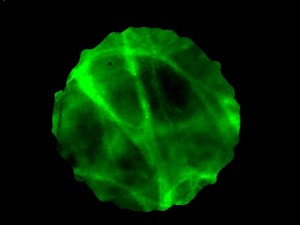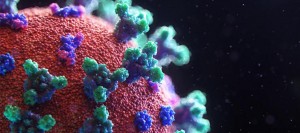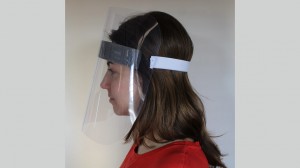The University of Bath has stepped up efforts to use its world-class expertise in helping tackle the spread of coronavirus with its rapid-response project now involving scientists, engineers and academics across a range of disciplines.
The university is leading on a major project aiming to find effective treatments for patients with Covid-19 ahead of a vaccine becoming available, while its engineers have now made more than 5,500 face shields for medical staff on the front line of the battle against the virus. 
Having set up a production line in the university’s Faculty of Engineering & Design to produce the shields, the team desperately needs more acetate, foam and elastic supplies and is calling on Bath firms to donate any items they may have.
The university’s Centre for Photonics and Photonic Materials is developing optical fibres and building endoscopic devices designed to access the tiny airways deep within infected patients’ lungs.
The centre has produced an opening batch of 360 optical fibre-based endoscopic devices and is now testing them for safety. If they prove easy to sterilise and robust enough to introduce into a patient’s body, they will be produced in their hundreds and sent to research collaborators at the University of Edinburgh.
The Edinburgh team of 150 scientists believes new therapies could be discovered and implemented before a vaccine becomes widely available by repurposing medicines for other conditions that are already in clinical use or are currently being tested.
Dr Jim Stone, research fellow at Bath’s Department of Physics and a member of the photonics team, said: “The endoscopic devices we produce contain our cutting edge optical fibre technology and are very small – around 1.4mm in diameter – so they can reach parts of the lungs that are usually very hard to access.
“Once an endoscope has reached the (deep and tiny) distal airways, we can take samples of lung fluid for analysis or introduce a trial drug.”
Optical fibres included in the endoscopes transmit microscopic images, providing researchers with real-time microscopic images from deep within the lungs at the exact location where drugs are delivered, or fluids are sampled.
Dr Stone said Bath was in a strong position to fine-tune its existing optical fibres and devices to fulfil the requirements of the coronavirus project. 
“We’ve been making fibres to address clinical needs for six years,” he said. “It’s a matter of adapting the work we’ve been doing on bacterial infections to focus on viruses instead.
“My experienced research team are refocusing all of their efforts on Covid-19, enabling us to develop and produce all the devices needed by our clinical collaborators in Edinburgh.”
The project – STOPCOVID – will focus on the inflammatory pathways that lead directly to lung injury, a response associated with the most severe aspects of Covid-19.
Inflammation is important in fighting infection but in the case of Covid-19, excessive inflammation is causing the lungs to fail, in some cases leading to death.
Researchers will test drugs to see if they can block this and other damaging types of inflammation in the early stages of the disease to change the course of infection and prevent the need of a ventilator.
The team is collaborating with scientists from global pharmaceutical companies and has already identified key drugs and mechanisms that are currently in development or are being used for other diseases.
The project could have a beneficial impact on millions of people who are affected worldwide, experts say. It could be a significant boost for low and middle income countries where people do not have access to intensive care and ventilation facilities. 
Meanwhile the 5,500-plus face shields produced by the university have been delivered to staff at the city’s Royal United Hospital (RUH) while it has also delivered 700 eye protectors to GP practices around Bath.
Royal United Hospitals Bath NHS Foundation Trust chief executive James Scott said: “Everyone at the RUH is incredibly grateful for the support we have received from the University of Bath.
“The thousands of face shields that have been donated free of charge to the hospital will help to keep our key frontline staff safe while we tackle one of the biggest challenges the hospital has ever faced.”
The effort to help protect RUH staff from Covid-19 during their work follows an initial donation of 500 face shields at the end of last month. Since then the work has continued and grown to maximise the scale of donations to departments around the hospitals.
Staff have made as many as 1,500 shields in one day and are set to produce even more as supplies arrive.
The team is now also using acetate left over from the face shields to produce eye protectors for GPs – 700 sets of which have now been sent to practices around Bath.
The eye protector frames have so far been made on campus using a combination of techniques including 3D printing, laser cutting and metal forming, however Herman Miller, which normally produces office furniture from its Melksham factory, is set to donate 600 3D-printed frames in the coming days.
A second version of the frames, made from laser-cut MDF, will be produced on-site at the university, while local residents with 3D printers have also volunteered the use of their machines.
Prof Richie Gill, who has been working on the university’s collaboration with the RUH and local businesses, said: “We are hugely grateful for everyone’s efforts in this project, both from university staff, staff at the RUH and GPs, who have helped to validate the designs, donors who have made significant contributions and from companies that have offered their help and resources.
“The equipment we’re making at the moment is relatively simple, but absolutely vital. The real test for us is making as much as we can, so taking a multi-pronged approach to maximise the amount we can hand over is key.”
The university’s Imaging, Design and Print Services team has donated acetate sheeting, as have several local individuals, while foam blocks and elastic ribbon have been sent by local firms.
Any businesses or individuals who could donate or supply materials including acetate sheets, foam blocks or elasticated ribbon can email medicalfaceshields@gmail.com
Other members of the team working to help the RUH are investigating whether a single ventilator could be made to safely supply two patients with air, and how simple oxygen sensors could be produced to help this.
The university is also making available its research and expertise to decision-makers from government, industry and the third sector via a new virtual Policy Fellowship Programme in response to the coronavirus crisis.
The unique, free, pairing scheme, coordinated via the Institute for Policy Research (IPR), can help those working through complex policy challenges by matching them with academics with particular expertise across a range of themes – from developing and storing vaccines, right through to the economic and business impacts of Covid-19, as well as its many health and societal implications.



















